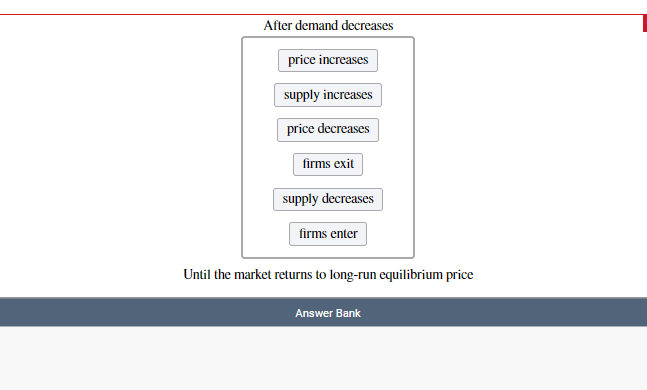Suppose in a perfectly (or purely) competitive industry, all firms have a minimum average total cost (ATC) of $100 at a quantity of 200 and a minimum average variable cost (AVC) of $46 at a quantity of 100. Initially, the industry is in long-run equilibrium. What is the long-run equilibrium price? long-run equilibrium price = $ 100 Suppose that the demand for the product decreases. Arrange the events in the order in which they occur after demand decreases until price returns to long-run equilibrium. Note that not all of the events need to be placed. After demand decreases price increases supply increases price decreases firms exit supply decreases firms enter Until the market returns to long-run equilibrium price Answer Bank
Suppose in a perfectly (or purely) competitive industry, all firms have a minimum average total cost (ATC) of $100 at a quantity of 200 and a minimum average variable cost (AVC) of $46 at a quantity of 100. Initially, the industry is in long-run equilibrium. What is the long-run equilibrium price? long-run equilibrium price = $ 100 Suppose that the demand for the product decreases. Arrange the events in the order in which they occur after demand decreases until price returns to long-run equilibrium. Note that not all of the events need to be placed. After demand decreases price increases supply increases price decreases firms exit supply decreases firms enter Until the market returns to long-run equilibrium price Answer Bank
Chapter12: The Partial Equilibrium Competitive Model
Section: Chapter Questions
Problem 12.9P
Related questions
Question

Transcribed Image Text:Suppose in a perfectly (or purely) competitive industry, all firms have a minimum average total cost (ATC) of $100 at a
quantity of 200 and a minimum average variable cost (AVC) of $46 at a quantity of 100. Initially, the industry is in
long-run equilibrium.
What is the long-run equilibrium price?
long-run equilibrium price = $
100
Suppose that the demand for the product decreases. Arrange the events in the order in which they occur after demand
decreases until price returns to long-run equilibrium. Note that not all of the events need to be placed.

Transcribed Image Text:After demand decreases
price increases
supply increases
price decreases
firms exit
supply decreases
firms enter
Until the market returns to long-run equilibrium price
Answer Bank
Expert Solution
This question has been solved!
Explore an expertly crafted, step-by-step solution for a thorough understanding of key concepts.
This is a popular solution!
Trending now
This is a popular solution!
Step by step
Solved in 4 steps with 1 images

Recommended textbooks for you

